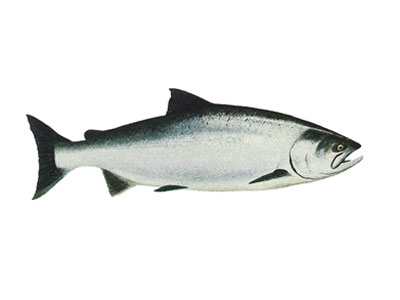 The Chinook salmon is largest of the Pacific salmon. The world record sport caught Chinook salmon weighed more than 97 pounds.
The Chinook salmon is largest of the Pacific salmon. The world record sport caught Chinook salmon weighed more than 97 pounds.
Sea run Chinook are anadromous; adults migrate from marine environments into the freshwater streams and rivers of their birth. Like other Pacific salmon, Chinook spawn only once and then die.
Chinook salmon have been stocked in the Great Lakes for over a century. The species has failed to find suitable spawning habitat, so continuous stocking is necessary to maintain Chinook populations. Adult Chinook salmon in the Great Lakes feed heavily on alewives.
Chinook salmon meat is red-orange in color, flaky, and firm with a high fat content. Wild caught Chinook is generally considered to be the best variety of salmon for the table.
Other names for the species include king salmon, tyee, Columbia River salmon, black salmon, chub salmon, hook bill salmon, winter salmon, and blackmouth.
Related Information